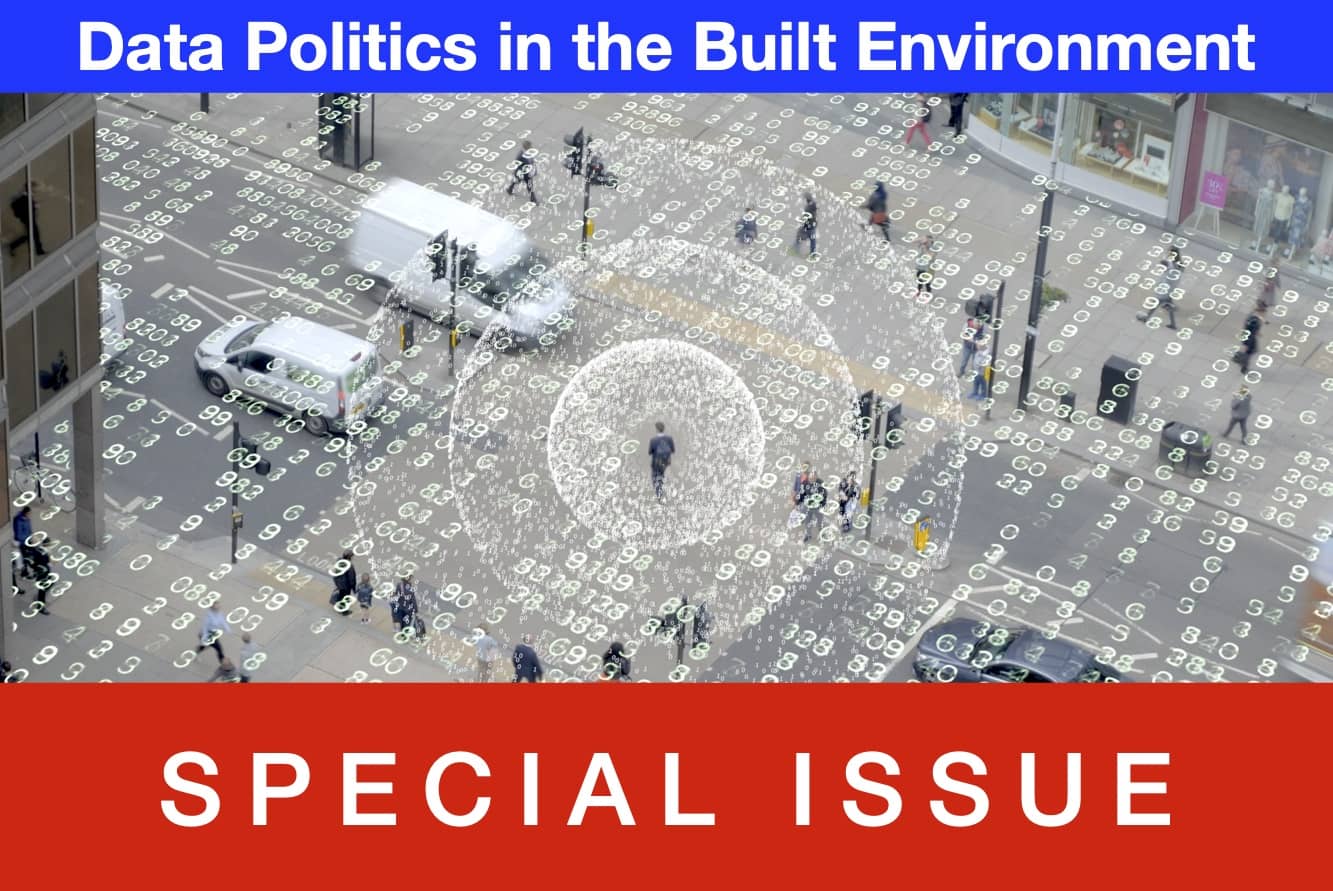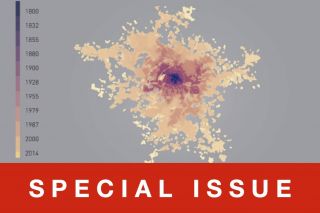
www.buildingsandcities.org/journal-content/special-issues/data-politics-si.html
Data Politics in the Built Environment

This special issue advances understandings of the practices, politics and power implications of data-driven buildings and cities
Buildings and cities are increasingly being reconfigured and reimagined by flows of data e.g. in smart homes and cities, digitally networked infrastructure services, shared mobility programmes and autonomous vehicles, surveillance and security systems, and urban control centres. The benefits of a datafied built environment are uneven and result in detrimental impacts to some individuals and groups at the expense of others.
Guest editors: Andrew Karvonen and Tom Hargreaves
Datafication processes are far from neutral. In many cases, the datafication of the built environment is invisible to users which has negative democratic implications. The asymmetrical access to data produces conditions that are beneficial to some but not all. Decisions about what data gets collected and what is ignored are unavoidably political processes that privilege some while neglecting others. This special issue raise key questions about how data-driven buildings and cities can be designed to be inclusive and democratic.
A key theme emerging from the special issue involves processes of societal exclusion that are commonplace in datafication. Mello Rose and Chang argue that datafication processes tend to ignore important sources of 'subjective socio-cultural data' while Sharma et al. highlight the under-representation of particular social groups and the perpetuation of existing structures of inequality. White and Larsson demonstrate how digital platforms produce social relations that are de-individualized and de-personalised to realise globalised and consumerist modes of life, while Sareen et al. show how digitalisation favours privatised and individualised structures rather than collective forms of management and ownership.
A second theme in the special issue is the centrality of local geographies and histories to datafication processes. All of the contributions emphasise the importance of qualitative methods and datasets to characterise local histories and geographies while providing a strong corrective to the universalising quantitative abstractions of most datafication processes.
This special issue highlights the importance of including civil society in the development of new visions and alternatives that can dismantle existing unjust power structures. The contingent character of datafication processes is not inevitable but is the result of particular actions that could have turned out differently. Commoning can be a means to normalise and institutionalise more progressive and inclusive forms of collective consumption. Data-driven processes that are founded in social justice could realise fundamental systemic changes. A more 'radical ethics' of data politics could serve to renegotiate and re-evaluate interconnected urban crises.
Table of contents
Data politics in the built environment (Editorial)
A. Karvonen & T. Hargreaves
Social justice implications of smart urban technologies: an intersectional approach
N. Sharma, T. Hargreaves & H. Pallett
Urban data: harnessing subjective sociocultural data from local newspapers
F. Mello Rose & J. Chang
Social implications of energy infrastructure digitalisation and decarbonisation
S. Sareen, A. Smith, S. Gantioler, J. Balest, M.C. Brisbois,
S. Tomasi, B. Sovacool, G. A. Torres
Contreras, N. Dellavalle & H. Haarstad
Disruptive data: historicising the platformisation of Dublin's taxi industry
J. White & S. Larsson
Feedback on the special issue
Phronesis and epistemic justice in data-driven built environments
Miguel Valdez
The data politics of tech corporations
Dillon Mahmoudi & Alan Wiig
Disruptive technologies and the regulator's dilemma
Andrea Pollio
Populist dissent and digital urbanism
Robert Cowley
Latest Peer-Reviewed Journal Content
Acceptability of sufficiency consumption policies by Finnish households
E Nuorivaara & S Ahvenharju
Key factors for revitalising heritage buildings through adaptive reuse
É Savoie, J P Sapinski & A-M Laroche
Cooler streets for a cycleable city: assessing policy alignment
C Tang & J Bush
Understanding the embodied carbon credentials of modern methods of construction
R O'Hegarty, A McCarthy, J O'Hagan, T Thanapornpakornsin, S Raffoul & O Kinnane
The changing typology of urban apartment buildings in Aurinkolahti
S Meriläinen & A Tervo
Embodied climate impacts in urban development: a neighbourhood case study
S Sjökvist, N Francart, M Balouktsi & H Birgisdottir
Environmental effects of urban wind energy harvesting: a review
I Tsionas, M laguno-Munitxa & A Stephan
Office environment and employee differences by company health management certification
S Arata, M Sugiuchi, T Ikaga, Y Shiraishi, T Hayashi, S Ando & S Kawakubo
Spatiotemporal evaluation of embodied carbon in urban residential development
I Talvitie, A Amiri & S Junnila
Energy sufficiency in buildings and cities: current research, future directions [editorial]
M Sahakian, T Fawcett & S Darby
Sufficiency, consumption patterns and limits: a survey of French households
J Bouillet & C Grandclément
Health inequalities and indoor environments: research challenges and priorities [editorial]
M Ucci & A Mavrogianni
Operationalising energy sufficiency for low-carbon built environments in urbanising India
A B Lall & G Sethi
Promoting practices of sufficiency: reprogramming resource-intensive material arrangements
T H Christensen, L K Aagaard, A K Juvik, C Samson & K Gram-Hanssen
Culture change in the UK construction industry: an anthropological perspective
I Tellam
Are people willing to share living space? Household preferences in Finland
E Ruokamo, E Kylkilahti, M Lettenmeier & A Toppinen
Towards urban LCA: examining densification alternatives for a residential neighbourhood
M Moisio, E Salmio, T Kaasalainen, S Huuhka, A Räsänen, J Lahdensivu, M Leppänen & P Kuula
A population-level framework to estimate unequal exposure to indoor heat and air pollution
R Cole, C H Simpson, L Ferguson, P Symonds, J Taylor, C Heaviside, P Murage, H L Macintyre, S Hajat, A Mavrogianni & M Davies
Finnish glazed balconies: residents' experience, wellbeing and use
L Jegard, R Castaño-Rosa, S Kilpeläinen & S Pelsmakers
Modelling Nigerian residential dwellings: bottom-up approach and scenario analysis
C C Nwagwu, S Akin & E G Hertwich
Mapping municipal land policies: applications of flexible zoning for densification
V Götze, J-D Gerber & M Jehling
Energy sufficiency and recognition justice: a study of household consumption
A Guilbert
Linking housing, socio-demographic, environmental and mental health data at scale
P Symonds, C H Simpson, G Petrou, L Ferguson, A Mavrogianni & M Davies
Measuring health inequities due to housing characteristics
K Govertsen & M Kane
Provide or prevent? Exploring sufficiency imaginaries within Danish systems of provision
L K Aagaard & T H Christensen
Imagining sufficiency through collective changes as satisfiers
O Moynat & M Sahakian
US urban land-use reform: a strategy for energy sufficiency
Z M Subin, J Lombardi, R Muralidharan, J Korn, J Malik, T Pullen, M Wei & T Hong
Mapping supply chains for energy retrofit
F Wade & Y Han
Operationalising building-related energy sufficiency measures in SMEs
I Fouiteh, J D Cabrera Santelices, A Susini & M K Patel
Promoting neighbourhood sharing: infrastructures of convenience and community
A Huber, H Heinrichs & M Jaeger-Erben
New insights into thermal comfort sufficiency in dwellings
G van Moeseke, D de Grave, A Anciaux, J Sobczak & G Wallenborn
'Rightsize': a housing design game for spatial and energy sufficiency
P Graham, P Nourian, E Warwick & M Gath-Morad
Implementing housing policies for a sufficient lifestyle
M Bagheri, L Roth, L Siebke, C Rohde & H-J Linke
The jobs of climate adaptation
T Denham, L Rickards & O Ajulo
Structural barriers to sufficiency: the contribution of research on elites
M Koch, K Emilsson, J Lee & H Johansson
Disrupting the imaginaries of urban action to deliver just adaptation [editorial]
V Castán-Broto, M Olazabal & G Ziervogel
Nature for resilience reconfigured: global- to-local translation of frames in Africa
K Rochell, H Bulkeley & H Runhaar
How hegemonic discourses of sustainability influence urban climate action
V Castán Broto, L Westman & P Huang
Fabric first: is it still the right approach?
N Eyre, T Fawcett, M Topouzi, G Killip, T Oreszczyn, K Jenkinson & J Rosenow
Social value of the built environment [editorial]
F Samuel & K Watson
Understanding demolition [editorial]
S Huuhka
Data politics in the built environment [editorial]
A Karvonen & T Hargreaves



Latest Commentaries
Decolonising Cities: The Role of Street Naming
During colonialisation, street names were drawn from historical and societal contexts of the colonisers. Street nomenclature deployed by colonial administrators has a role in legitimising historical narratives and decentring local languages, cultures and heritage. Buyana Kareem examines street renaming as an important element of decolonisation.
Integrating Nature into Cities
Increasing vegetation and green and blue spaces in cities can support both climate change mitigation and adaptation goals, while also enhancing biodiversity and ecological health. Maibritt Pedersen Zari (Auckland University of Technology) explains why nature-based solutions (NbS) must be a vital part of urban planning and design.